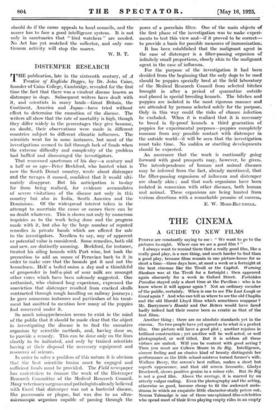DISTEMPER RESEARCH
That renowned sportsman of his day—a century and a half or so ago—Peter Beckford, who hunted what is now the South Dorset country, wrote about distemper and the ravages it caused, confident that it would ulti- mately disappear. But his anticipation is to-day far from being realised, for evidence accumulates of severe visitations of the disease not only in this country but also in India, South America and the Dominions. Of the widespread interest taken in the attempt to ascertain the cause or causes there can be no doubt whatever. This is shown not only by numerous inquiries as to the work being done and the progress made with it, but also by the large number of reputed remedies in private hands which are offered for sale to the investigators. Needless to say, any of apparent or potential value is considered. Some remedies, both old and new, are distinctly amusing. Beckford, for instance, treated his ailing hounds with Port wine, but took the precaution to add an ounce of Peruvian bark to it in order to make sure that the hounds got it and not the kennelmen. Half a boiled onion a day and a thimbleful of gunpowder in half-a-pint of sour milk are amongst other cures which have been solemnly suggested. One enthusiast, who claimed long experience, expressed the conviction that distemper resulted from cracked skulls contracted through rough handling on railway journeys ; he gave numerous instances and particulars of his treat- ment but omitted to mention how many of the puppies had recovered under it.
So much misapprehension seems to exist in the mind of the public that it should be made clear that the object in investigating the disease is to find the causative organism by scientific methods, and, having done so, to provide a remedy. This can be done only on the lines shortly to be indicated, and only by trained scientists having at their disposal the necessary equipment and resources of science.
In order to solve a problem of this nature it is obvious that the best scientific brains must be engaged and sufficient funds must be provided. The Field newspaper has undertaken to finance the work of the Distemper Research Committee of the Medical Research Council. Many veterinary surgeons and pathologists already believed with Carre that distemper was not a bacterial disease, like pneumonia or plague, but was due to an ultra- microscopic organism capable of passing through the pores of a porcelain filter. One of the main objects of the first phase of the investigation was to make experi- ments to test this view and—if it proved to be correct— to provide a basis for possible measures of immunization.
It has been established that the malignant agent in the case of distemper is a filter-passing organism of infinitely small proportions, closely akin to the malignant agent in the case of influenza.
For the purpose of the investigation it had been decided from the beginning that the only dogs to be used should be puppies specially bred at the field laboratory of the Medical Research Council from selected bitches brought in after a period of quarantine outside and placed in special breeding kennels. The bitches and puppies are isolated in the most rigorous manner and are attended by persons selected solely for the purpose. Only in this way could the risks of chance infection be excluded. When it is realized that it is necessary to breed in fly-proof kennels a third generation of puppies for experimental purposes—puppies completely immune from any possible contact with distemper in the outside world—it will be seen that the investigation must take time. No sudden or startling developments should be expected.
An assurance that the work is continually going forward with good prospects may, however, be given. The interdependence of human and animal diseases may be inferred from the fact, already mentioned, that the filter-passing organisms of influenza and distemper are closely akin ; and that such organisms have been isolated in connexion with other diseases, both human and animal. These organisms are being hunted from various directions with a remarkable promise of success.
E. W. MOSS-BLUNDELL.










































 Previous page
Previous page